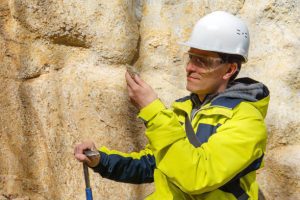| Geologist Key Stats | |
|---|---|
| Avg. Salary / year | $108,940 |
| Avg. Pay / hour | $52.37 |
| Education | 4+ Years |
| Job Outlook | 14.1% |
| Total Employed | 6,770 |
A geologist researches the earth’s surface and materials.
Working as a geologist you could find yourself studying the history of the earth, monitoring earthquake activity, contributing to conservation projects, or writing academic papers, just to name a few.
When you become a geologist, you will need to be strong academically.
There is a good deal of education required, even once you are working in the field.
Being good at math, English, history, and the sciences is essential.
Having skills with data analysis and statistics is also an important part of the role.
If you enjoy studying natural history and have a curiosity as to how things work, then it’s likely that becoming a geologist would make an excellent career path for you.
Perhaps the most important thing you need to succeed as a geologist is passion for the subject matter.
There are very few positions for geologists around, so you’ll need to work hard to be able to work in this field.
Go to Page Section:
Educational Requirements to Become a Geologist
To become a geologist, you will need quite a few years of education.
To begin with, you will need to complete a four year degree with a major in geology or geophysics.
If you’re still in high school, focus on getting good grades in math and science subjects.
With a Bachelors degree, you will qualify for some entry level jobs.
Many academic roles, as well as positions with state and federal government organizations, will require you to attain a masters or doctorate.
Many aspiring geologists gain a part time job in the field while they are achieving their graduate qualifications, often assisting on research projects or teaching.
An alternative is to work full time after you finish your undergraduate degree, then pursue your postgraduate studies part time.
Internships and research projects are a large part of becoming a geologist.
You will probably start out helping others with their projects, then go on to complete your own research while still at college.
There are internship programs that allow you to go out on the field and get some firsthand experience.
Geologist Job Description
The job description of a geologist is varied.
Some may spend their time completing field work in remote locations, while others may spend their careers teaching.
Others work for petroleum or mining companies analyzing sites.
Working outdoors is an essential part of the role of most geologists.
Just as much time is spent inside, working at a computer or analyzing research.
If you enjoy a combination of working environments, then the job description of a geologist will suit you perfectly.
One of the benefits of becoming a geologist, is that there are many different areas of the field you may find yourself working in.
Here are some of the tasks a geologist may find themselves completing:
- Analyzing samples such as rock or fossils
- Working on the field at a site
- Completing a research paper
- Analyzing data and research work
- Teaching others in the field
- Completing feasibility studies
Geologist Salary and Career Path
Most geologists will start their career in entry level positions, such as a research assistant, a teacher, or similar.
Once they have established themselves, gained some experience, and completed postgraduate qualifications, they can move on to more senior positions.
A geologist could work for a wide range of employers, from a state park, to an oil or mining company, or for a college, depending on their area of expertise and skills.
Specializations within geology include mineralogy, hydrology, hazardous waste management, environmental legislation, chemistry, oceanography, physics, and cartography.
A geologist who works in research will spend a good amount of time on the field, where they will conduct research at a grass roots level.
They will be expected to publish academic papers regularly, and keep up to date with their contemporaries.
Many field researchers also hold academic positions.
Some geologists will work mainly in academic positions, and spend most of their time teaching.
To have this kind of position, it would be expected that you complete a few years of field work, or attend some field expeditions occasionally.
These geologists also need to publish regularly.
Many geologists work within the private sector.
they are employed by companies that have an interest in mining or petroleum.
The geologist will attend sites where mining or drilling is occurring and make sure that the site is feasible as well as safe.
They will also work to identify future sites for mining.
This kind of geologists spends much time in the field, as well as in meetings, or preparing reports.
The median wage of a geologist is $79,000 a year.
Those in entry level position could expect to earn around $50,000 a year.
The top 10% earn in excess of $150,000 a year.
As you become a geologist, it can take a lot of time and studying, however if this area is you passion then it is likely you will enjoy your time at college.
Many geologists report excellent job satisfaction within their role.
![]() The below information is based on the 2024 BLS national averages.
The below information is based on the 2024 BLS national averages.
National Average Salary
$108,940Average Salary by State
| State | Avg. Annual Salary |
|---|---|
| Alabama | $100,700 |
| Alaska | $122,830 |
| Arizona | $113,770 |
| California | $135,060 |
| Florida | $109,780 |
| Idaho | $101,450 |
| Illinois | - NA - |
| Indiana | $118,020 |
| Kentucky | $107,100 |
| Maryland | $91,380 |
| Michigan | $114,870 |
| Minnesota | $98,790 |
| Montana | $97,980 |
| Nevada | $115,360 |
| New Mexico | $119,020 |
| New York | $93,810 |
| Ohio | $99,290 |
| Oklahoma | $115,040 |
| Oregon | $97,720 |
| Pennsylvania | $100,230 |
| South Dakota | $99,720 |
| Tennessee | $106,250 |
| Texas | $107,330 |
| Utah | $114,290 |
| Virginia | $102,960 |
| West Virginia | $92,130 |
| Wisconsin | $111,690 |
| Wyoming | $115,040 |
The highest-paying state in this field is California, with an average salary of $135,060.
Here are the five states with the highest salaries in the field:
* Employment conditions in your area may vary.
Frequently Asked Questions
What does a geologist do?
Geologists are specialists who study the history of our planet, in order to explain current occurrences and predict the future.
A geologist studies floods, volcanic eruptions, earthquakes and investigates earth materials.
There are a few different fields in geology; you can become an engineering geologist, an environmental geologist, a planetary geologist, a marine geologist, a geophysicist, a geomorphologist, an economic geologist, a petroleum geologist, a paleontologist or a geohydrologist.
The duties will differ depending on the specialization; however, there are some typical tasks that geologists usually perform – rock core, mud, and geotechnical logging; mapping and fieldwork; geochemical, microscopic, and geomechanical analysis; computer-based work; report writing, and so on.
How much do geologists make?
On average, a geologist can make a little more than $91.000 per year in the United States.
In case you decide to follow this career path, you can expect to earn anywhere between $49.000 and $188.000 annually.
The salary would certainly depend on a variety of factors – your education and experience level, the employer, the location and so on.
Geologists that work in Texas and Oklahoma, for example, have the highest average salaries.
An entry-level geologist can expect to earn $24 per hour, while specialists with years of experience can make $90 per hour.
How much does it cost to become a geologist?
You would certainly need a bachelor’s degree in geology, in order to qualify for an entry-level position.
A year in a university can cost you anywhere between $8.000 and $45.000 (and more); the cost depends on a variety of factors (the books, supplies, and accommodation expenses are not included).
To improve job perspectives, you should go for a master’s degree ($6.000-$22.000 per year).
Those who want to become a university professor and conduct independent research should have a doctorate degree ($36.000-$49.000).
What is the demand for geologists?
Between 2016 and 2026, the geologist job market is expected to grow by 14.1%, according to the Bureau of Labor Statistics.
That is a lot faster than the national average for all occupations in the United States.
Geologists will be in particular demand in the ‘green energy’ sector; professionals will be asked to identify suitable locations for the construction of solar power plants, wind farms, and geothermal power facilities.
The industry is mainly concentrated in California, Colorado, and Texas.
How long does it take to become a geologist?
It will take you 4 years to obtain a bachelor’s degree.
A bachelor’s degree should be enough to qualify for jobs in non-profits and government (in most cases).
A master’s degree will typically take you 2 years to obtain, while a doctorate degree will require 3-7 years.
The employers would expect you to have a degree in geoscience and laboratory, field, and internship experience.














